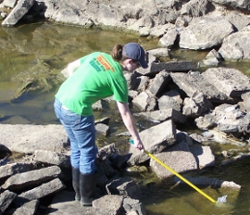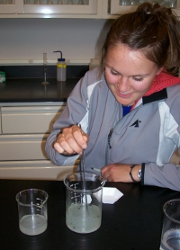What is Environmental Engineering?
What Do Environmental Engineers Do?
Environmental Engineers are the technical professionals who identify and design solutions for environmental problems. Environmental Engineers provide safe drinking water, treat and properly dispose of wastes, maintain air quality, control water pollution, and remediate contaminated sites due to spills or improper disposal of hazardous substances. They monitor the quality of the air, water, and land, and they develop means to protect the environment.

Environmental Engineers work in many venues, including engineering consulting firms that design and construct air and water pollution-control systems; industries that need to treat air or wastewater discharges; private and municipal groups that supply drinking water; companies that treat and dispose of hazardous chemicals; governmental agencies; laboratories that develop pollution-control systems; agencies that transfer knowledge to the developing world; and public interest groups that advocate environmental protection. Third world countries are in dire need of environmental engineers. Over 1.1 billion people worldwide live without safe drinking water and 3.4 million people die annually from water-related diseases. One student organization, Engineers Without Borders, is involved in helping a small village in a third-world country with safe drinking water. See video CSU EWB in El Salvador
The curriculum is based on a strong foundation in natural sciences, mathematics, biological sciences, and engineering fundamentals. Upper level courses address engineering applications in air, water, land pollution, and environmental toxicology in which pollution prevention and control measures are emphasized. Other topics include agricultural and environmental measurements, rate-controlled separations, basic hydrology, environmental law, and environmental ethics. Careful selection of technical electives allows students to specialize in a related field of interest.
How Can You Become an Engineering Student?
In high school, focus on academic courses emphasizing English, mathematics, sciences, social studies, and complete:
- Four units of English including reading, composition, grammar, literature, and speech.
- One unit each of algebra I, geometry, algebra II, and one-half unit of trigonometry/precalculus.
- One unit each of chemistry or physics and natural science (including laboratory work).
- Two units of social science and one additional unit of either natural or social science.
- Three units of academic electives (can include foreign language).
You will also need to develop good study habits and strong time management skills.
As a Environmental Engineering Student, You Will:
- Participate in freshman and senior design projects, allowing you to apply multiple tools to solve engineering problems.
- Understand the impact an environmental engineer has on society.
- Have opportunities to get involved with active student organizations.
- Work with outstanding faculty members who conduct strong research programs, bringing new knowledge to your classes.

During Your First Year, You Will:
- Take mathematics and science courses to build a foundation for future environmental courses.
- Learn how to apply important concepts to engineering problems in the introductory civil courses.
- Practice writing and speaking clearly in composition and arts and humanities courses.
- Explore Fort Collins and discover some of its great recreational and cultural opportunities.
Frequently asked questions and answers for students considering enrollment in the Department of Civil and Environmental Engineering.
